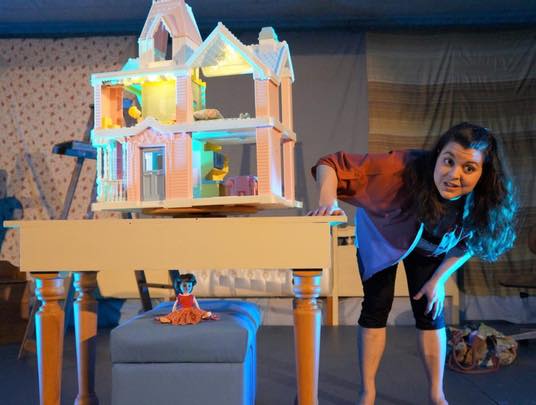Thu 7/25-Sat 7/27
The lights dim. From stage left, we hear a cheery voice: “hellooooo,” repeated. A young woman, carrying an enormous bottle, continues her sing-song greeting and waves her bottle at all. She brandishes the bottle, beginning to sing “When the moon hits your eye….” When the words fail her impaired memory, she rings her sister, asking for the words of the song that Grandma used to sing to them.
We have entered the one-person tour-de-force tale of writer/performer Amy Schwabauer’s journey in pursuit of love, strength, courage and acceptance — a journey through alcohol. The one-woman play was directed by Dale Heinen.
Amy single-handedly takes us through her young life. The simply decorated stage set serves wonderfully for all the places and events that she relives before our eyes. She moves to a chair and opens a large jewelry box, telling us in loving detail about her dog Scout, who had to be euthanized.
Amy then becomes her six-year old self, put to bed too early because her brother is having a party in their parents’ absence. She sneaks downstairs and is entranced by all the teenagers, whom she looks up at them in adoring wonder. When the party breaks up at the untimely arrival of the parents, Amy runs, slips and falls in a puddle of beer. She is covered in it, soaked in it — bewitched by the odor of the beer.
A mime in the grand tradition of David Bowie, Amy has choreographed her story so beautifully we can see each stage in her journey through liquid courage. Her entire body is fully immersed in each act — dancing drunkenly, running, playing basketball, climbing the ladder/tree, drunken rambling, biology lab scene where we can see the frog and scalpel in her hands. Dramatically staged pauses between emotional stops in the intensely personal journey are staged and repeated throughout, in sober tones.
We are taken along the path toward alcohol through Amy’s unlovely early teen years. College is a chance for exploration — and underage drinking. She has her first blackout, then wakes up wondering, did she have sex? Then her first boyfriend, her first act of penetration, her first disappointing sex. She becomes the Make-Out Whore, lots of drinking leading to lots of sex. As her drinking increases, bottles are everywhere on the stage, in her life.
With her existential crisis, Amy stands at her alcoholic crossroads, anguished cries to her mother that she doesn’t want to die. Mother asks, “Amy, do you think you should stop drinking?”
Amy steps into the light, finally sans a bottle: broken but healed and stronger. This is a powerful piece of theater. Every movement, every item on the stage, every deft movement, every word, envelop us in the young woman’s journey through alcohol and loss and shame to a dual sobriety and finding her majestic strength.
[Written by Donna M. Shimko]
